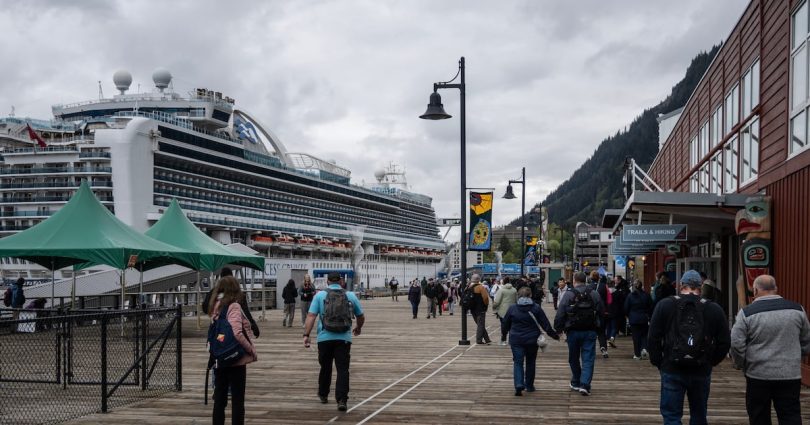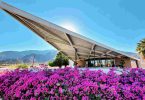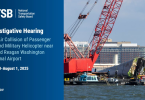Alaska tourism operators say the season seems a little off after years of strong growth in the industry, with some operators seeing evidence that the Trump administration’s confrontational approach to international relations is complicating the picture.
Some are reporting slightly slower bookings among international and independent travelers this summer. But the cruise ships, which are booked well in advance and bring most visitors to the state, are arriving at full capacity.
It’s still early in the season, with limited data to paint a clear image of how Alaska’s travel industry is doing. Some businesses report healthy sales, while others say they are seeing reduced traffic, and the season may just end up flat.
According to some operators, some international travelers have canceled their trips to Alaska this summer, frustrated by President Donald Trump’s aggressive posture toward other countries, including Canadians angered by his threats to annex their country.
And some U.S. travelers appear to have put off their Alaska plans, concerned about the economic impacts of Trump’s trade war and his efforts to slash federal employees, they say.
However, as concerns about a U.S. tourism slowdown play out nationally, the effects may be slower to materialize in Alaska, if they happen at all, people in the tourism industry say.
They say the state is a bucket-list destination where travelers book early, with a reputation that often sets it apart from the full U.S.
The season so far is “a mixed bag,” said Josh Howes, president of Premier Alaska Tours that transports cruise travelers.
“I can tell you that the cruise ships are full,” he said.
But international and independent travelers that book on shorter timelines may have held off in the spring, he said. Now, however, they seem to be jumping back in, as fears about tariffs and the economy ease, he said.
“I think we’ve seen a lull, but that may be picking back up,” he said. “When it’s all said and done, we’ll probably be a little bit down or maybe flat due to independent travelers. But that’s generally a good thing, since everyone had a decent year last year.”
Hotel stays in Anchorage were down about 5% in May, said Jack Bonney, a spokesperson with Visit Anchorage, the city’s visitors bureau.
That’s based on room-night use in the city falling about 9,650 that month from the year before, he said, citing data from STR, a global hotel analysis company.
That “something to watch,” Bonney said.
But Anchorage operators are “cautiously optimistic” for a strong season by summer’s end, he said.
Industry investment is also high, including with multiple hotel renovations such as the downtown Wildbirch Hotel, replacing the Aviator Hotel, he said.
That suggests a positive outlook for the long-term, he said.
“We have some signals that signals that look good, and some signals that look concerning,” he said.
Canceled bookings, reduced traffic
Carl Donohue, owner of Expeditions Alaska, providing backpacking and other outdoor excursions, said about six individual clients from Canada and Europe canceled trips this summer because of the Trump administration’s international approach to trade, immigration and other issues, he said.
Some have even foregone their deposits, losing much of the cost of their trips. The company provides guided trips in places like Denali National Park and Preserve or the Arctic National Wildlife Refuge. Prices can run $5,000 a guest, on average.
“It’s just a sort of a general sentiment that the current administration seems to be pushing or messaging toward the rest of the world,” he said. “It just seems adversarial, and people don’t want to come spend their money with adversaries.”
Overall the company has more trips to lead this year than in 2024, part of a long-term growth trajectory, he said.
But the lost business matters, Donohue said.
It reduces overall income and cuts down guest lists for long-planned trips, potentially making them uneconomical.
“From a sustainability-of-business standpoint, those trips have to be full,” he said.
Trump’s wild swings in tariff policy proposed on some countries also complicate any long-term outlook, he said.
“When that is switched on and off so radically, it makes it hard to plan,” Donohue said.
Fewer Canadians in Southeast
The community of Haines, 45 miles from the Canadian border, has experienced falling visitation from Canada, said Rebecca Hylton, Haines’ director of tourism.
On Memorial Day, a popular craft beer festival in the Southeast Alaska town saw 20% fewer ticket sales than usual. A bike race from Yukon to Haines has seen a similar drop in participants signing up.
“We are missing some of our Canadian friends, for sure,” Hylton said.
Canadian visitors to the city are “very, very important. I can’t stress that enough,” she said.
Down the Lynn Canal in Skagway, tourism director Jamie Bricker said cruise ship numbers are strong this year. But there’s been a drop in RV park bookings compared to last year, she said.
Community leaders in Haines and Skagway have tried to repair that relationship and urge continued friendship with Canadians.
“The relationship that exists between Alaska and the Yukon is a friendship beyond borders,” Bricker said. “We’re ready for them, and we welcome their visitorship.”
Cruise ship numbers strong in Southeast
In Juneau, the cruise ships that began arriving in April are reported to be at 100% capacity.
A record 1.68 million cruise ship passengers visited Southeast Alaska last year, The Juneau Empire reported in October.
Industry watchers say they are expecting similar passenger numbers this year.
Meilani Schijvens, owner of Rain Coast Data that provides economic analysis in the region, said there was ”uncertainty” facing the visitor industry at the start of summer.
She cited both Trump’s actions and ballot initiatives that sought to limit cruise ship passenger numbers in Juneau and Sitka — both failed to be approved.
But early indicators suggest Southeast Alaska will have another strong summer tourism season.
“It’s such a large volume of passengers,” Schijvens said in a Friday interview. “And so I think it’s still going to be really positive for the Southeast economy.”
Some Juneau tourism operators are reporting a strong start to the season.
“We are super busy,” said Serene Hutchinson, general manager of Juneau Tours and Whale Watch.
Hutchinson said she had spoken to several Canadian visitors who had considered canceling their trips to Alaska.
But they would not have been refunded the full amount of their booking, she said.
“So they’re like, ‘We might as well go,’” she said.
Liz Perry, president and CEO of Travel Juneau, said that wild stock market swings and a grim economic outlook seemed to dampen tourism spending nationally.
She said that some Juneau tourism businesses are reporting a “soft” May and a “slight decline” in spending.
Perry, and others in the tourism industry, are concerned that Alaska cruise ship passenger numbers could drop next year and beyond.
“2026 is going to be the one to watch,” Perry said.
‘Definitely that pushback′
Tom Tougas co-owns two hotels in Seward and Major Marine Tours that provides wildlife and glacier viewing in Kenai Fjords National Park.
A major cruise destination in Southcentral Alaska, the small town sees about 200,000 cruise guests annually.
Tougas said business this year has been consistent with last year, even though several rainy days haven’t helped with sales on the boats.
“I think people feel like it’s slower,” but the data tells a different story for Major Marine and the two hotels, he said.
Many visitors to Seward made their reservations a year in advance, well before Trump was elected, helping insulate the town from any lost business, he said.
Tougas said his companies are handing out stickers to welcome Canadian guests. They feature a snout-nuzzling Canadian moose and Alaska bear with the words, “Good friends are hard to find.”
In Talkeetna, a jumping-off point for trips to Denali, companies that provide flightseeing and mountaineering support are seeing some signs of economic concern among their guests.
Courtney Shaffer, general manager at Talkeetna Air Taxi, said its visitor volume is steady with past years.
But an “ever-so-slight” number of groups — maybe two-and-a-half out of 35 a day — are now passing on the glacier landing, an extra feature that adds costs.
“A theory is that it could be due to the climate of an unstable economic wave,” Shaffer said.
K2 Aviation was “way ahead” on bookings early this year, compared to the prior year, said Suzanne Rust, co-owner at the company.
“But the strong bookings began to back off in April,” she said.
She said bookings are still ahead of where they were last year, possibly because of the strength of that early activity.
“We’ll know a lot more in another month,” she said. “We’re watching a number of factors. The economy. International travel. Booking patterns and how things changed after COVID-19″ when people were scrambling to book after being cooped-up, she said.
She has friends from the UK who told her they canceled their plans to come to Alaska this year out of concern about things happening in the U.S. Friends from Austria told her they were only coming to the U.S. because they have family to visit, she said.
“There is definitely that pushback,” she said. “I believe one thing we’ll see is that we’re going to be potentially more impacted in 2026.”
Overall, tourist activity in Talkeetna, population 1,000, seems unusually slow, she said.
Cyrus Aldeman, who says his title is “Chief Experience Officer” at Anchorage Trolley Tour, said the red trolleys that shuttle visitors around the city aren’t as full this year as they have been.
But he still expects sales to be in the top 10 years, after 30 years in operation.
“We’re about 3% down as of right now, but it’s been a rainy couple weeks, so that could be it,” he said. “Sunshine sells.”
Moose-birth sightings have been at an all-time high for the company, so lots of guests are leaving happy after getting “National Geographic” sightings, he said. He believes a relatively low-snow winter improved moose grazing.
He said airfare to Alaska has fallen, a good sign that could draw more travelers, he said.
“People buy tickets last-minute all the time, so I think this will be a great year,” he said.
“It’s next year that I’m more cautious about, but I’m always cautiously optimistic,” he said.










